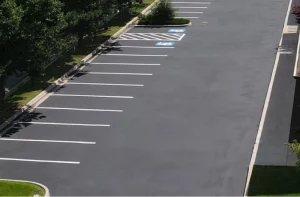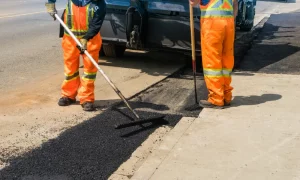Why Asphalt Maintenance is a Smart Financial Investment:
When it comes to managing your property, asphalt maintenance might not always be top of mind, but it’s one of the most important financial investments you can make. Whether it’s a driveway, parking lot, or road, asphalt is subjected to constant wear and tear from traffic, weather, and environmental elements. Without regular maintenance, minor issues can quickly turn into major, costly repairs. Investing in the upkeep of your asphalt not only extends its lifespan but also saves you money in the long run. Here’s why asphalt maintenance should be viewed as a critical financial investment:
1. Prevents Expensive Repairs
Asphalt naturally degrades over time due to exposure to elements such as sunlight, water, and chemicals. Small cracks and potholes that are left untreated can rapidly worsen, leading to structural damage. By investing in routine maintenance such as crack sealing, sealcoating, and patching, you can address minor issues before they escalate into major, costly problems like full-depth repairs or resurfacing. Spending a little now on preventative maintenance can save you from a much larger expense down the road.
2. Extends the Lifespan of Your Pavement
Asphalt, when properly maintained, can last 20-30 years or longer. Routine maintenance helps to preserve the integrity of the surface, protecting it from harmful UV rays, moisture penetration, and the freeze-thaw cycles that cause cracks and potholes. Sealcoating, for example, acts as a protective barrier, slowing down the oxidation process and preventing water infiltration. By extending the life of your pavement, you’re maximizing the value of your original investment and delaying the need for costly replacement.
3. Improves Property Value
A well-maintained asphalt surface adds to the overall curb appeal and value of your property. Cracked, faded, or damaged asphalt can give the impression of neglect, which can hurt your property’s marketability. Whether you own a commercial business or a residential property, a smooth, well-kept parking lot or driveway enhances the appearance and increases the property’s perceived value. Should you decide to sell or lease, a maintained asphalt surface becomes a selling point that potential buyers or tenants will appreciate.
4. Enhances Safety and Reduces Liability
Cracked or uneven asphalt surfaces can pose a significant safety risk to drivers and pedestrians. Potholes, loose gravel, and cracks can cause vehicle damage, accidents, or injuries, leading to potential legal liabilities. By investing in regular asphalt maintenance, you minimize these risks and ensure that your property is safe for visitors, customers, or tenants. Avoiding accidents or injuries on your property also means avoiding potential lawsuits or liability claims, which can be financially devastating.
5. Cost-Effective Long-Term Strategy
Asphalt maintenance is a fraction of the cost compared to complete pavement replacement. Implementing a consistent maintenance schedule allows you to spread out your expenses over time, making it easier to budget for smaller, routine fixes instead of facing a massive one-time cost when the pavement fails prematurely. In essence, you’re paying for protection and longevity rather than reacting to costly emergencies.
6. Minimizes Disruptions to Business
For commercial properties, pavement repairs or replacements can lead to business disruptions, including limited access for customers or delivery trucks. Routine maintenance reduces the need for emergency repairs, which often require longer downtime to fix. With planned maintenance, you can schedule work during off-hours or less busy times, minimizing disruptions to your operations and keeping your business running smoothly.


